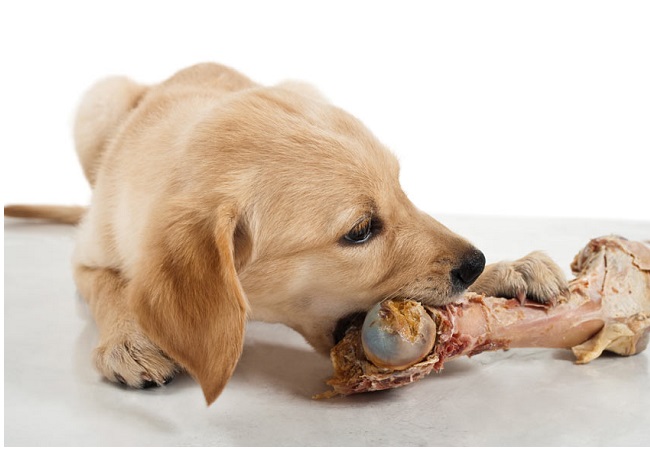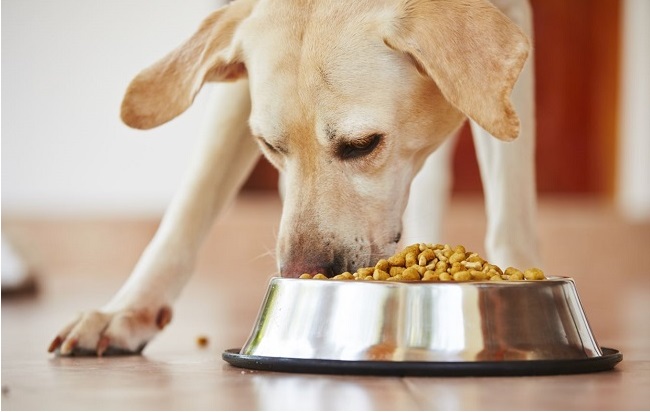The debate surrounding the orientation of dogs has been ongoing for years, backed with some noteworthy points.
“Are dogs carnivores or omnivores” has been making the rounds for a long period.
There are different schools of thought about it.
Even the vets have various scientific reinforcements to this question.
Yes, we know that this is a highly controversial topic but after our extensive research, we can sum it up and come to a conclusion that dogs are omnivores. *Sigh of relief*

Scientists strongly believe that humans had started considering dogs as their companions about 20,000 years ago! But if they’ve been around for so long, how do people still not have a conclusion for it? If you have a similar question in mind, then you have come to the right place. We have conducted thorough research and formulated an intensive study on the same.
So buckle up to get some concrete answers and explanations.
Table of Contents
End of the Debate with Science
People believe facts, as they rightly should. So we have presented the following scientific backing that will answer your question, “are dogs carnivores or omnivores?”
Let us start with the differentiation between the different categories.
What are omnivores?
An omnivore is an animal that relies on both- plant and animal matter for its food requirements.
What are carnivores?
A carnivore is an animal that relies on meat or animal tissue for its food requirements.
What are herbivores?
A herbivore is an animal that relies on plant-based matter for its food requirements.
Dogs have inherited the adaptive digestive system from their wolf clan. At the same time, they have picked up different traits along the way as they started getting domesticated. It concludes that dogs carry the ability to include vegetables as well as meat in their daily diet.
Note: Do you know how many cups in a pound of dog food required for your canine. Get all the information here.
Reasons Why Dogs are Omnivores
Several factors contribute to the omnivore characteristics of dogs. We have segregated those components in the following manner:
1. The Gastrointestinal System
If you didn’t know already, a dog’s digestive system works very differently as compared to ours. Even more than that, it differs based on natural food instincts.
The digestion of a plant-based diet is considered to be more time-consuming and complicated. Plants contain a bit of starch and cellulose. Unique digestive enzymes like amalyse and cellulase are necessary to break down such materials and convert them to sugar.
This can be further absorbed by the small intestine. Herbivores and omnivores secrete amylase in their saliva to break down such food components.
Even though dogs and cats do no produce salivary amylase, dogs do have the capability to excrete amylase from their pancreases.
The herbivores have the longest GI tracts, ranging at about 100 feet in length. It includes areas for fermentation of cellulose that is comparatively difficult to break down.
On the other hand, omnivores have medium length GI tracts of about 20-40 feet. Cats, which are carnivorous, have a GI tract of only 12-14 inches. This is because their diet includes meat that can be digested easily.
The GI tract of a dog also stands at 2 feet. Even though it is shorter than a herbivore, it is larger than that of a carnivore. Thus, as they fall in the middle, they can be considered as an omnivore.

2. Dental Functionality
Over the years, the size, shape, and fitting of teeth have been evolved and adapted according to the surroundings and diet preferences. Herbivores have long and wide molars with flat surfaces. This allows them to properly grind their high-fiber plant source-based diet. This is a necessary step as it breaks down the plant material into smaller matter.
Their dentition is designed to pick the plant materials like grass. They possess a long tongue that is used to push back the grass to the back of the mouth where it is ground by strong and efficient molars.
On the other hand, the dentition of a carnivore is strikingly different. Their teeth are designed to rip and tear the meat into shreds and gulp it down.
If you have seen the teeth of lions, or even cats, they are long and pointed which allows deep penetration into the prey. They can easily rip the meat off of the bone. The teeth firmly lock in place that allows them to rip the flesh away.
Dogs have a similar denture fixture as they have inherited it from their wolf relatives. But this doesn’t confirm the fact that they are carnivorous as their teeth have relatively flat surfaces. They carry the capability of shredding the meat apart from the bone as well as digesting plant-based food materials.
3. Conversions
Dogs’ digestive systems have evolved to carry out certain conversions to get all the nutrients. They can convert plant-based beta-carotene, which is also known as provitamin A, to Retinol (the purest form of vitamin A).
Carnivores are unable to make this conversion and hence, they hunt for other animal sources to get it. They can also convert an essential omega-6 fatty acid, linoleic acid (LA), that is found in plant-based sources, to arachidonic acid.
Dogs possess enzymes that help them in producing the essential amino acid arginine. They can also convert the essential amino acid tryptophan to niacin. Carnivores are unable to do so. Lastly, they can also synthesize taurine, and carnivores like cats are unable to do so.
Reasons Why Dogs are Considered to be Carnivores
It is necessary to consider both sides of the debate for a comprehensive understanding. So, let us now look into the facts that led the people to believe that their dogs are carnivores in nature.
1. Metabolisms
Dogs have inherited a lot of traits from their wolf relatives. As carnivores have to hunt down their prey and do not possess the luxury of getting their food served to them, they can have a significant break between their meals. Similarly, dogs can also survive without any food for a long period of time. But this doesn’t mean that you should keep your dog starving for hours.

2. Behavior
If you are a dog parent, you might certainly have noticed your dog nibbling your toes or fingers. This is a distinctive characteristic of a carnivore. A dog also showcases other carnivorous attributes like digging, pouncing, etc.
3. Fermentation
Few doctors believe that the length of the intestine doesn’t matter. On closer research, it was found that the total volume of a dog’s and a cat’s intestines are somewhat similar. Along with that, they have emphasized the coefficient of fermentation.
Herbivores have a high ability to extract nutrition from a plant-based matter as they can ferment it. On the other hand, carnivores are unable to do so and have a low coefficient of fermentation.
As more number of people consider dogs to be carnivorous as they have a low coefficient of fermentation.
What Should Be Included In Your Dog’s Diet?
We hope that your question “Are dogs carnivores or omnivores” is successfully answered and justified.
If you are wondering about what kind of diet should your dog have, you’re not the only one. A lot of the pet parents are unaware of the necessary nutrients that are required by their canine. To provide all the necessary nutrients to your best friend, make sure you include the following components in his/her diet:
1. Protein
Protein is an essential factor that is imperative for your dog’s overall growth. Protein is made up of 22 natural amino acids, out of which dogs can only produce 10 on their own. This means that have to rely on external products for the remaining amino acids.
It is a natural or biological instinct of dogs to go for food that has a high proportion of amino acids to fulfill their protein requirements. That being said, there are also plant-based proteins that are considered to be an incomplete source of proteins.
Even though dogs can benefit from some of the amino acids from a plant-based protein source, it is necessary to opt for meat-based protein for comprehensive growth.
You should also consider the digestibility of the diet to keep track of your dog’s digestive system. You must include eggs, beef, lambs, chicken, etc as they are easy for the dogs to digest. On the other hand, plant-based protein sources like corn, wheat, and soy might give a hard time to the digestive system of your dog.

2. Carbohydrates
It has been highly assumed that dogs do not require carbohydrates in their diet. But the reality is different as they get the required energy from starch, sugar, and dietary fiber found in carbs. It not only improves the immune system but also helps in regulating blood glucose concentrations.
3. Fats and Fatty Acids
Fats are a concentrated source of energy that is consumed by a dog’s body before using carbohydrates or proteins. Fatty acids help in developing the body’s tissues, cells, muscles, and nerves. Omega-6 acids can be provided through chicken, pork fat, corn oil, etc.
Omega-3 fatty acids can be found in salmon, flaxseed, etc.
Generally, dogs do not suffer from high cholesterol. But to control their weight and avoid obesity, it is necessary to regulate the amount of fat included in your dog’s diet.
Learn More: Does your dog need a veterinary diet? Get all the information about your dog’s diet.
Other Relevant Questions
How are the teeth of grain-eating animals?
The teeth of grain-eating animals are broad and ridged. It makes it suitable for grinding and chewing. On the other hand, the teeth of meat-eating animals are sharp and pointed. This allows them to penetrate their prey’s flesh and rip it off of the bone.
Can dogs survive without meat?
Even though dogs can derive nutrition from plant-based food sources, it is not recommended to take the meat out of their diets. It is necessary for their overall growth and development.
Are wolves omnivores or carnivores?
Wolves are true carnivores and consume little to no amount of plants as their food. Dogs have inherited several characteristics from them. But due to excessive domestication, dogs are omnivores in nature.
What do dogs naturally eat?
It is an instinct of a dog to prey on smaller animals like rats, rodents, birds, rabbits, etc. However, their anatomy is such that they can consume plant-based protein sources as well.
Are dogs scavengers?
Dogs are considered to be opportunistic scavengers. This means that they will eat anything edible that they can find.
Wrapping Up
Questions like “are dogs omnivores“, or “are dogs carnivores” have been around for years. Even though there is no solid answer for it, science leans towards confirming that dogs are omnivores.
Dogs need the necessary nutrients to live a healthy life. There have been instances of certain dogs surviving on a completely plant-based diet. But we would suggest you verify it with your vet before you change your dog’s diet plan. You must know what is right and what is wrong for your dog. Take the right decision and inculcate all the necessary nutrients in your canine’s daily diet.
Also Read:
- How Long Does Rawhide Take to Digest in Dog
- How Long Does It Take For A Dog To Digest Food and Poop
- Is Your Puppy Ready for Adult Dog Food
Resources:
- Are dogs carnivores? – Quora
- The Evolutionary Basis for the Feeding Behavior of Domestic Dogs and Cats – OUP Academic
- In Ice Age Siberia, a Meeting of Carnivores May Have Given Us Dogs – NYTimes
- Guidance for Industry #122 – Manufacture and Labeling of Raw Meat Foods for Companion and Captive Noncompanion Carnivores and Omnivores, May 18, 2004, revised November 9, 2004 – FDA
When things come crashing down, Tiffany comes to the rescue! As a veterinary medicine graduate, she is the brain behind the in-depth analysis of the products. As an avid dog lover, she is earnestly driven to find the finest options. Any article on DogNeedsBest that has to do anything with your pet’s health goes under scrutiny before getting published.


